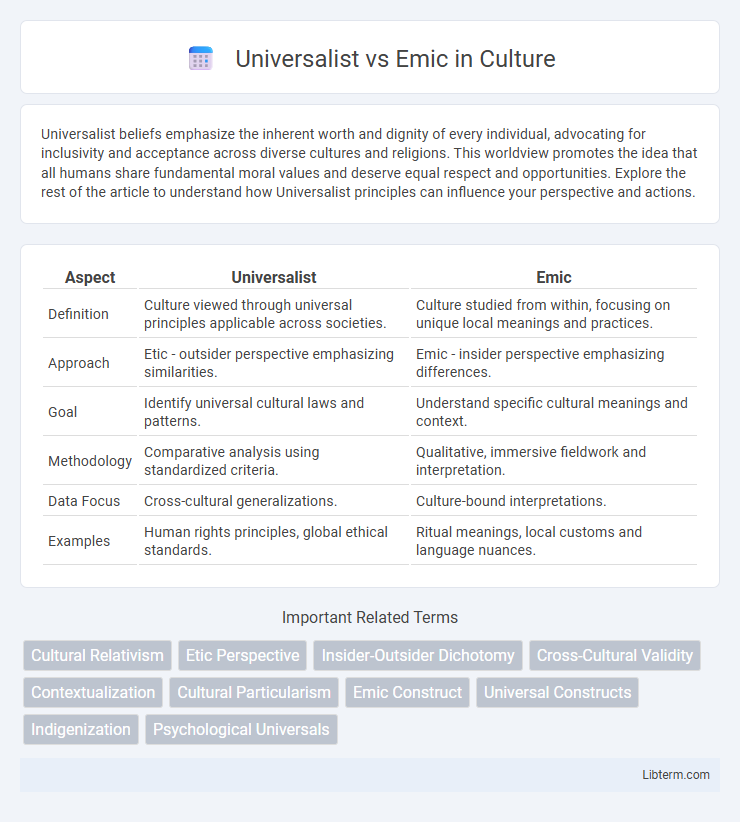Universalist beliefs emphasize the inherent worth and dignity of every individual, advocating for inclusivity and acceptance across diverse cultures and religions. This worldview promotes the idea that all humans share fundamental moral values and deserve equal respect and opportunities. Explore the rest of the article to understand how Universalist principles can influence your perspective and actions.
Table of Comparison
| Aspect | Universalist | Emic |
|---|---|---|
| Definition | Culture viewed through universal principles applicable across societies. | Culture studied from within, focusing on unique local meanings and practices. |
| Approach | Etic - outsider perspective emphasizing similarities. | Emic - insider perspective emphasizing differences. |
| Goal | Identify universal cultural laws and patterns. | Understand specific cultural meanings and context. |
| Methodology | Comparative analysis using standardized criteria. | Qualitative, immersive fieldwork and interpretation. |
| Data Focus | Cross-cultural generalizations. | Culture-bound interpretations. |
| Examples | Human rights principles, global ethical standards. | Ritual meanings, local customs and language nuances. |
Understanding Universalist and Emic Perspectives
Universalist perspectives emphasize identifying common psychological principles and behaviors that apply across all cultures, promoting standardized approaches to human experience. Emic perspectives focus on understanding culture-specific meanings, values, and practices by exploring individuals' lived experiences within their cultural context. Recognizing the balance between Universalist and Emic approaches enhances cross-cultural research, allowing for both generalizable theories and deep cultural insights.
Historical Origins of Universalist and Emic Approaches
The Universalist approach in anthropology and social sciences originated in the 19th and early 20th centuries, rooted in theories that emphasized common human traits and universal cultural norms across societies. Emic approaches emerged later, particularly influenced by the works of Franz Boas and the development of cultural relativism, emphasizing the importance of understanding cultures from an insider's perspective. These historical origins reflect a shift from broad generalizations in Universalism to context-specific interpretations in Emicism, highlighting evolving methodologies in cultural analysis.
Core Principles of the Universalist View
The Universalist view emphasizes that core principles of human rights and ethics are inherent and consistent across all cultures, rooted in shared human dignity and rationality. It asserts that fundamental moral standards, such as justice, freedom, and equality, apply universally regardless of cultural or societal differences. This perspective supports the enforcement of global norms and laws that uphold these principles worldwide.
Defining the Emic Perspective
The emic perspective centers on understanding cultural phenomena from within the social group, prioritizing native concepts, values, and meanings as defined by insiders. It contrasts with the universalist approach by emphasizing context-specific interpretations rather than applying external frameworks or generalizations. Researchers adopting the emic approach seek to capture authentic experiences and culturally grounded knowledge unique to each community.
Key Differences: Universalist vs. Emic Approaches
Universalist approaches emphasize cross-cultural similarities by applying universal theories and standards to human behavior, suggesting that certain psychological or social principles are consistent across all cultures. Emic approaches prioritize understanding culture-specific phenomena by examining behaviors and beliefs within the context of the local culture, highlighting unique cultural expressions and meanings. The key difference lies in universalism's search for generalizable truths versus emic's focus on culturally relative insights and indigenous perspectives.
Applications of Universalist and Emic Perspectives in Research
Universalist perspectives in research emphasize applying general principles and theories across diverse cultures to identify common patterns in human behavior, often used in cross-cultural psychology and global health studies. Emic approaches prioritize understanding phenomena from within specific cultural contexts, essential for ethnographic research and culturally sensitive interventions. Combining both perspectives enhances validity by integrating universal findings with culturally nuanced insights, improving the applicability and relevance of research outcomes.
Universalist and Emic Perspectives in Cross-Cultural Psychology
Universalist perspectives in cross-cultural psychology emphasize the existence of universal human behaviors and mental processes that transcend cultural differences, seeking common psychological principles applicable across diverse societies. Emic perspectives prioritize understanding culture-specific experiences and behaviors by examining psychological phenomena within the unique context of each culture, highlighting the importance of cultural relativity. Both approaches contribute to a comprehensive understanding of human behavior by balancing generalizable psychological theories with culturally distinctive insights.
Criticisms and Limitations of Universalist and Emic Approaches
The Universalist approach faces criticism for imposing a one-size-fits-all framework that often neglects cultural specificity and local diversity, leading to ethnocentric biases. In contrast, the Emic approach is limited by its potential for subjective interpretation and difficulty in making broad generalizations across cultures. Both approaches struggle with balancing the need for cultural relativity and the demand for cross-cultural comparability in research and practice.
Bridging the Gap: Integrative Methodologies
Universalist and emic approaches offer contrasting perspectives on cultural analysis, where universalist methods emphasize generalizable patterns across cultures, and emic methods prioritize insider viewpoints and cultural specificity. Bridging the gap involves integrative methodologies that combine quantitative cross-cultural comparisons with qualitative, context-rich ethnographic insights to capture both shared human experiences and unique cultural nuances. This hybrid approach enhances the depth and accuracy of cultural research, fostering more holistic interpretations and practical applications in anthropology and social sciences.
Future Directions in Universalist and Emic Research
Future directions in universalist research emphasize integrating cross-cultural cognitive and behavioral patterns through advanced neuroimaging and AI-driven data analytics to validate overarching human traits. Emic research is increasingly adopting immersive ethnographic methods combined with digital ethnography to capture nuanced, context-specific cultural practices and meanings. Both approaches are converging, leveraging mixed-methods frameworks to enhance cultural sensitivity and generalizability in psychological and anthropological studies.
Universalist Infographic

 libterm.com
libterm.com